Comedy and comedians have always been a hot topic, but even more so in the past few months for a variety of reasons. David Raibon, who is a former police officer turned comedian and actor, shares his journey from being a cop in Texas to pursuing a career in comedy and acting in Phoenix and the LA area.
Raibon has a long history in the entertainment world. He has appeared on Russell Simmon’s HBO Def Comedy Jam, Martin Lawrence’s First Amendment on Starz, “Way Black When” on TV One, “Off Tha Chain” on the Bounce Network, and Weekends at The DL on Comedy Central. David has toured all over the world making people laugh on tours overseas including Iraq, Kuwait, Japan, Korea, and Germany entertaining America’s troops. In addition to being a seasoned stand up he has made appearances on such television shows as, “Just Shoot Me,” “Six Feet Under.” “Without A Trace.” “NYPD Blue,’NCIS” “Las Vegas,” “My Name Is Earl,” “How to Get Away with Murder,” a recurring cop on “Punk’d” best known as recurring guest star as the snitch “Van Bro” on the hit series “The Shield.” FX’s “Snowfall” and recurring guest star on “Ballers” on HBO and “Insecure”, and latest, an urban sex comedy, “Three Ways” on HULU.
In this interview he discusses how his talent for making people laugh as a class clown eventually led him to become a police officer who could make people laugh even while arresting them. Raibon also talks about his experiences performing comedy overseas, including entertaining American troops in Iraq and Kuwait. He emphasizes the importance of laughter in relieving stress and discusses the obstacles he faced as a Black comedian in a predominantly white industry. Raibon shares a funny anecdote about being left behind by fellow comedian Mike Epps during a tour. He also comments on the recent controversies involving comedian Katt Williams and discusses the role of comedy in sparking important discussions and delivering messages in a humorous way. Raibon shares his unique love story, how he met his wife after a chance encounter at a comedy show, and discusses his upcoming projects, including the Fifty Shades of Comedy tour and his involvement with the Atlantic City Laugh House.
As an introspective person, Raibon also reflects on the challenges of balancing the demands of a career in comedy with family life, highlighting the support of his wife and children in his pursuit of his passion. Raibon went on to discuss his philanthropic efforts, including organizing charity comedy events to give back to the community and support causes close to his heart.
Through his engaging storytelling and unique comedic style, Raibon continues to captivate audiences and leave a lasting impression in the world of entertainment.
Finally, he reveals his dream team of comedians, and shares what we can expect from him in the immediate future.
You were a police officer from 1984 to 1993–Can you share your journey of transitioning from being a police officer to becoming a successful comedian? How did your experiences in law enforcement shape your comedic perspective?
Well, it’s just interesting, and to think we punished kids like me when we were little. We called them class clowns because at the time, we don’t have any idea of what they’re trying to communicate. The talent that they have is not ready because they’re in school and it could be considered disrespectful. So, I was a class clown. I was class clown in elementary school, high school, college, police academy; everywhere I had an audience, I was a clown. But one day I was just a bartender and I just heard that they were hiring. I was thinking I should just give it a shot. And I didn’t think they would hire me. I mean, I was little, undersized, they’re never going to hire me. And then they hired me, the next thing I know, I was a cop that basically has the gift of gab of a comedian. So, I had guys going to jail laughing at times. Oh, yeah. They were cracking up.
You’ve toured all over the world. Is the reception you get from audiences in the states different from those in other countries and if so, what’s your perspective on why?
Well, it depends… We went to London, and they speak English, but it’s a different dialect, so you can’t really understand them half the time. They can’t really understand you half the time. But when I went to Iraq and Kuwait, just mostly performing for the American troops, we literally would load up on a Black Hawk helicopter and fly out to the middle of the desert and just jump out and running into a tent, tell jokes to Marines sitting on tables, picnic tables, in a tent, and then get back on and fly to another one. And we did that… That was pretty wild. But it was basically American soldiers. So, they all understood. They needed to laugh.
Everybody needs to laugh. They say laughter is the best medicine. What do you have to say about people who are dealing with trauma, or dealing with adversity in their life? How does laughter actually help them get through things?
Well, stress kills, and you can’t laugh and be stressful at the same time. You know what I mean? So, if you have to find something that tickles your funny bone, find something that you really like, that you enjoy, and it makes you happy, and in that happiness, you may find laughter. But you can’t let stress run its course because it’ll take over you.
So, I know you have hundreds, even thousands of stories probably about you being on the road and touring as a comedian, but is there one memorable moment you could share with our audience about something funny that might’ve happened to you, or something that somebody said?
The only thing that comes to mind that will always come to mind, there will never be another one, I was doing a tour as a creative tour, and creative tour started like Norfolk, Virginia. Starts there and it ends like in Atlanta, Georgia. And I did it twice. I did it once with Rodney Winfield and I drove, and this time I did the second time with Mike Epps. And we got to one city, and we worked. I went back to the room and Mike went out, came back about 2:00, 3:00 in the morning kind of drunk, going, “Hey man, I’m going to Atlanta. Let’s go to Atlanta.” I’m already in the bed. You know what I mean? So, he left me. He left me in my hotel room, so I had to catch a Greyhound bus to the next gig. And when I got there, he’s like, “Man, I was going to come back and get you.” So that’s Mike. I’ve auditioned for his show two, three times. He won’t even make amends, but you can’t have two light-skinned, handsome guys on the same show.
Speaking of comedy along with world-class comedians, considering the recent news with the amazing and authentic Katt Williams, do you think that he came out and participated in the conversations that he’s been having about other comedians to elevate himself and his own brand? What do you think his motivations have been? I really want some insight on that from another comedian who’s doing really well.
Well, Katt… I think what he’s doing primarily, as he said, this is the truth year, and that’s a good platform for his comedy tour and his specials. I mean, Katt is hot. You can’t be mad at somebody unless the truth hurts. I mean, I only had one couple experience and me and D.L., I played a round of golf with Katt and D.L. in Calabasas once, and he was neat watching, it’s like watching a little person pimp play golf. His hair was flying in the wind. But Katt’s funny. I wish he would’ve said something about me, got me some publicity out of it. I’m like, “Man, come on.”
So, how important is it for comedy to spark important discussions? What are some of the platforms that you stand on that you really believe in that you know that you’re going to be able to bring comedy into the picture for?
Well, the thing about comedy, it fits anywhere because everybody wants to laugh, but it’s also an anecdotal opportunity to get something in really bad. You slide it in under the funny thing, then you have a better opportunity that people be able to swallow it. It’s like taking a pill, and on the outside of that pill there’s a coating. The inside of that pill is nasty as hell, but on the outside, you can stand it for a few seconds. That’s kind of how comedy is. While you are laughing, we slap you in the back of the head with some reality.
Well, you are coming up on an anniversary with your lovely wife. You have a really unique story about how you guys met. Can you share that with everybody?
Yes, I’m stuck here in Arizona. I got kidnapped, basically. Working with D. L. Hughley a few years ago, I went to the bathroom after doing a show in Mesa and met her in the lobby and took her to meet D.L. and her sister to meet D.L. They took me out to eat, dropped me off, and didn’t talk to her ever again because we didn’t exchange phone numbers until another club in Tucson had a cancellation as a headliner, and I got it through an email. I just went to LinkedIn, was looking for a cute face to come, and she lived in Buckeye. I asked her was Buckeye close to Tucson. She said it wasn’t that far. And she said she liked comedy and asked me if I remembered her, and I didn’t. Turned out, same person. So, 2/20/24 will be four years.
As a trailblazing black comedian, what obstacles have you faced in your career and how have you overcome them?
Well, the biggest obstacles, basically, is just getting an opportunity. When I started, white clubs wouldn’t book Black comedians. Not the top clubs. And even then, you have to be a special Black comedian that had accomplished so much, that worked with so many white comedians that they felt you fit in. So, I had to build my own ideas and my own comedy club. And back in the ’90s I did come up with a comedy club called the Hip Hop Comedy Stop with Rushion McDonald and J. Anthony Brown. And we ran that for a few years. And Beyonce was a small child and came through our amateur night on Thursday nights. So, it was a hot club, and it was really something. And it gave an opportunity for a lot of comedians in Houston to get on television. We would fly in like Maxine Lewis from Showtime at the Apollo, or Lynne Harris Taylor from BET Comic View, or Bob Sumner from Def Comedy Jam, give them a clipboard, have them sit there and look at our talent in our city, they pick and choose what they want. That’s how they got on television.
Now, if you were to have a dream team of comics, who would the three top dream team people be for you to take on tour with you?
Richard Pryor, Dave Chappelle, and the last but not least, me. If I could have one more, me. That’s it.
Lastly, what projects or upcoming shows can we expect from you that continue to showcase your passion for breaking barriers through humor?
Well, I’m going to continue to do the Fifty Shades of Comedy with my partners Robbie Peron and tour different cities and stuff. I’m trying to get back into television. Now that COVID is over and the SAG strike is over with, I’m trying to get my feet back on the ground, had to do some changing with representation, but I still got my manager. So, I just keep waiting to see what’s coming up next. I also working on something in Atlantic City. The Atlantic City Laugh House is attached to Caesar’s Casino and they’re going to have a grand opening April 1st, and I’ll be working down there with Rod Millwood, who’s the owner, and some other talented people. So, looking forward to that. That’s right on the water, right on the ocean; Atlantic City.
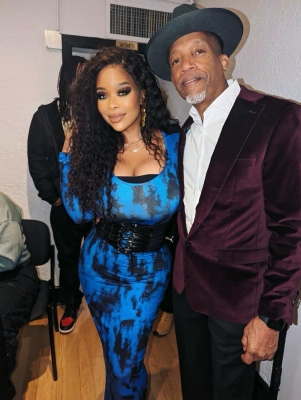
It was a pleasure talking with David and understanding more about his comedic journey. The rapid evolution of digital platforms and social media has revolutionized the way comedy is consumed, shared and allows comedians to reach wider audiences and connect with fans on a more intimate level. David chooses to share his gift with the masses because it is part of who he is. Laughter is universal and the viral nature of comedic content on platforms like TikTok, Instagram, and YouTube has enabled him and other comedians to showcase their talent, express their unique perspectives, and engage with diverse communities in innovative ways.
To learn more about David and to find out where to catch him next, visit: DavidRaibon.com
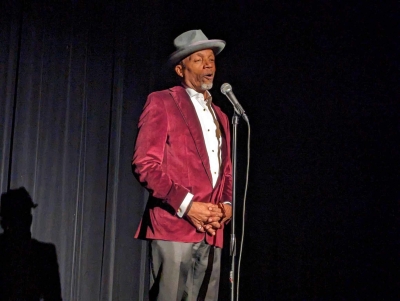
Photo Credits: Courtesy of David Raibon

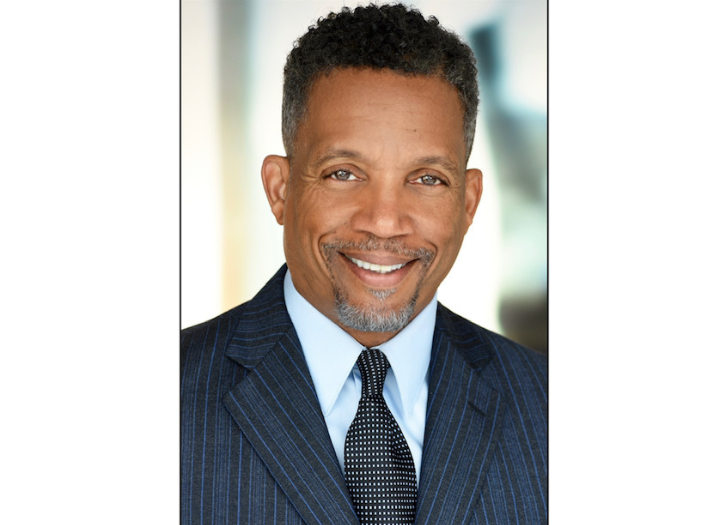
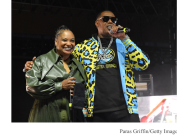
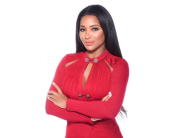

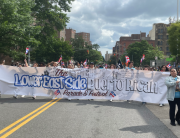
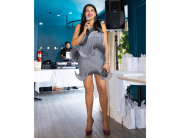
Add Comment
You must be logged in to post a comment.